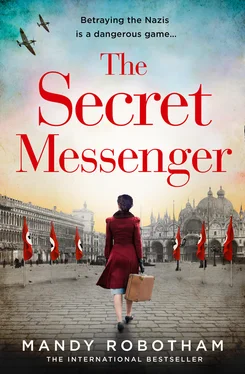Yet Venezia Liberare does not lie side by side on the newsstands with Il Gazzettino and other mainstream papers, those largely controlled by fascist sympathisers. It’s created, printed and collated in this tiniest of spaces, packed and transported under cover of darkness to all corners of Venice, where shopkeepers loyal to the cause will keep a pile of ‘something special’ under their counters, passing over the goods on the quiet, and, with it, the word that we are all still here. Ready and waiting.
‘Hey, Stella, we’ve got eight pages to fill tonight. I hope you’re raring to go,’ Arlo says enthusiastically. My heart sinks for a second and my fatigue rises like a wave but, as I pull up my chair and lift the lid on my typewriter, there’s a rush of energy within me. Just the sight of this machine has that effect on me. It’s much smaller and neater than my industrialsize typewriter in the Reich office, the one with a high slope of keys and tall roller, the shiny metal of grey and black, emulating the SS livery. The shine that my own machine once sported on its black frame is now dimmed and scratched, and some of the bright white keys are grey and smudged with ink, tattooed with my own fingerprints, but it cheers me like a good friend. For years now, since Popsa brought it home on my eighteenth birthday, this small machine has been my workmate, my comrade even. My voice.
We’ve been through quite a lot. In what now seems like an entirely different life as a journalist, I shunned the heavy, brooding office typewriters in favour of my neater, more portable tool. We went on story assignments together, allowing me to type up my notes quickly, settle my thoughts on paper, sometimes sitting on the steps of a nearby church or outside a quiet café, basking in the spring sunshine. I was a junior reporter only, but it was my dream job after high school: slightly frowned on by Mama, secretly tolerated by Papa, and overwhelmingly encouraged by Popsa.
‘This could be your future,’ he’d beamed as I’d opened the carefully wrapped birthday present. ‘You can win battles and change minds with this, Stella – better than any weapon.’ He had insisted on buying an Olivetti machine, the good Italian family firm having solid anti-fascist affiliations, later proven in their wartime actions of creative sabotage which saved many lives.
Of course, being Popsa, he was right. I typed until I drove the entire household to distraction; I created stories, I tapped out memories and wrote fairly terrible poetry. And all those words, channelled from inside me onto the page, via the conduit of my beautiful, clattery Olivetti, helped me towards securing my dream post on Il Gazzettino , the influential daily covering the entire mainland Veneto region surrounding Venice. I was blissfully happy for a time, until its increasingly fascist politics became as dark as the storm clouds of war over Europe.
However, I haven’t got time to dwell on that as I sit in the much less salubrious – but no less important – underground office of our clandestine newspaper. In my hand is a sheaf of hand-scrawled notes on crumpled scraps of paper, some typewritten reports and shorthand transcripts of radio transmissions. Each has made its way from Resistance members in Venice or captains in charge of the mountain fighting groups, via several messengers, to our unassuming basement office. Mothers and grandmothers have sat for hours in their dimly lit kitchens listening to transmissions via Radio Londra – the aptly named BBC service which brings us news of the outside world – scratching down details of the fight beyond Venice. Somehow, in the next three hours, I have to understand and shape these snapshots of defiance into news stories, in time for Arlo and his one regular helper, Tommaso, to typeset and print our weekly edition of Venezia Liberare . It’s our own, tangible way of telling ordinary Italians that they are not alone in the fight against fascism.
Matteo brings me another welcome cup of coffee and I set to work. Not for the first time, I thank providence that my first year on Il Gazzettino was spent converting press statements into readable stories. Back then, I thought it a form of punishment for the new girl, intensely frustrated at not being allowed beyond the office doors to carry out any real reporting. Now I know it was a valuable skill to perfect. As each story is finished, I tear it from the machine, lean backwards in the chair and hand it to Arlo and Tommaso, a young boy not yet out of school whose father is a partisan lieutenant, as they set to work mapping out the pages.
Tommaso is fairly new to our little workroom and, we’ve recently discovered, is something of an artist with a gift for adult cartoons; his dry, sarcastic take on fascist leaders – our pompous beloved Benito Mussolini especially – has worked its way into the pages. In among the serious reports of partisan victories in the mountains, ground captured and trains derailed, we’re able to provide a lighter tone to our readers. After all, it’s our sense of humour as Italians that’s enabled us to survive through twenty years of fascist oppression, and a war to top it off. In the cafés and canteens and campos , you can still hear Venice laugh.
When he first joined us, I could sense Tommaso’s wonder at the barmaid in her apron typing out the stories – the whispered question to his fellow setter – until Arlo explained that my name is on the bar’s list of employees and as such I have to be ready to play my part at a second’s notice, albeit quite badly. Fascist soldiers occasionally make it over to Giudecca in the late hours, looking for trouble, alcohol, or both. Only a month ago. two officers – already half-drunk – demanded drinks along with the employee rota; I just managed to make it up from the basement in time to grab a discarded apron, steering them away from the ‘beer cellar’ with a winning smile and several more drinks. Since then, I’ve donned an apron as a habit.
As the evening wears on I feel myself flagging, and several times Arlo prods me playfully.
‘Come on, girl, anyone would think you’ve done a day’s work!’ he teases.
I see him peering at my copy intently, rubbing his ink-marked fingers on his forehead, and I wonder how many typing mistakes I’ve made out of sheer tiredness. Ones that he will have to correct in the final print.
‘Everything all right, Arlo?’ I say.
‘I’m just wondering when you’re going to replace that old crock of a machine, Stella? This wayward e is driving me crazy.’
Automatically, I put a hand to my beloved machine in defence, taking comfort from its familiar, rough surface. It’s true that being a little too portable has caused one of the metals shafts to shift slightly, making my typed sentences easily recognised with a sagging e . It’s only Arlo’s expertise in re-setting the print that makes sure my machine’s quirk doesn’t transfer to the finished newspaper.
‘At least you can tell it’s written by a master,’ I come back swiftly. And that’s how we combat our fatigue: with innocent banter, to shield against the bad news that occasionally filters through the ranks – having to write of fellow partisans captured or tortured, at times executed. In those moments we force ourselves to think of the bigger picture, of what we can realistically achieve in a tiny basement with almost no resources; we do what we can to inform, to spread the word and help fuel solidarity among fellow Venetians.
I stretch and yawn as I finish the last piece for Arlo to edit and set.
‘Have you enough to fill the pages?’ I say, hoping he does. My eyes can’t seem to focus beyond my nose at this point. Usually, I stay until the setting is complete, but I need to catch the last vaporetto from Giudecca back to the main island and I’ll have to walk home quickly to beat the curfew. More than once I’ve been stopped by a fascist or Nazi patrol, and I’ve all but used up my smiles and excuses of a sickly relative needing medicine.
Читать дальше












